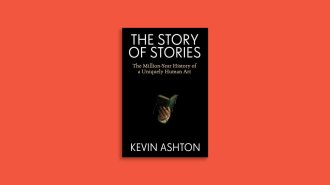Science journalists don’t use the science of ‘nudge’
- More than 2 years ago
 The “nudge” may have been formalized in a 2008 book, but I’d bet that the core concept — simple strategies for influencing other people’s decisions — dates back at least to the rise of human language. It wouldn’t surprise me if early hunter-gatherers on African savannas relied on some strategies of persuasion to convince, for example, other members of the group to help hunt for food. These hunter-gatherers weren’t analyzing what text message to send and when, questions that can concern today’s “choice architects,” as described by behavioral sciences writer Bruce Bower in “Nudge backlash.” But the most astute communicators might have realized that appealing to survival, adventure or sense of duty could lead to varying results. And they might have adjusted their messages accordingly.
The “nudge” may have been formalized in a 2008 book, but I’d bet that the core concept — simple strategies for influencing other people’s decisions — dates back at least to the rise of human language. It wouldn’t surprise me if early hunter-gatherers on African savannas relied on some strategies of persuasion to convince, for example, other members of the group to help hunt for food. These hunter-gatherers weren’t analyzing what text message to send and when, questions that can concern today’s “choice architects,” as described by behavioral sciences writer Bruce Bower in “Nudge backlash.” But the most astute communicators might have realized that appealing to survival, adventure or sense of duty could lead to varying results. And they might have adjusted their messages accordingly.
A lot of human communication, in fact, is designed around achieving specific results. So much of what we see on TV and online is aimed at selling us a product or an idea, with some strategies subtler than others. Even communications among family members or friends can be deliberately tilted toward building relationships and establishing trust. It’s not necessarily a bad thing.
Recently in Boston, at a meeting of the American Association for the Advancement of Science, I attended a session titled “From Literacy to Dialogue: How to Best Communicate (Controversial) Science.” Speakers including Catherine Snow, an education professor at Harvard, and Alan Leshner, former head of AAAS and vice chair of the board of trustees for Society for Science & the Public, which publishes Science News, discussed specific research findings that might inform how scientists share their knowledge with policy makers and the general public. Though the term “nudge” was never used, audience members wanted to know how to encourage scientists to speak openly about issues such as global warming, how to push for science literacy in communities with more pressing problems, such as poverty, and — one of the most heated questions — how the general public might react when scientists march on Washington.
These are worthy discussions but not the preoccupations of science journalists. I was glad to be no more than a fly on the wall. Though journalists have their own public perception battles to fight, when it comes to communicating, our primary objective is to inform. Science journalists, myself included, strive to be clear and concise, but we are not trying to change your opinion, win you over or urge you to take action. Science News writers and editors will not, for example, tell you under what circumstances gene editing is right or wrong or whether Zealandia deserves to be called an eighth continent. We value human health and happiness, but we have no investment in DNA vaccines. And though a lot of us are technophiles, our coverage is indifferent to the fate of virtual reality. We aim to report the facts, so you can use those facts to make informed judgments.
In other words, we’ll leave the nudging to someone else. Except maybe in this editor’s note. So in the spirit of transparency, I’ll make the nudge a straightforward appeal: I hope you’ll read and enjoy the stories in this issue.







